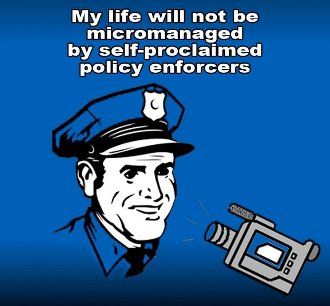Rialto police: Inspiration for the nation. Really.
by Chris Reed | November 28, 2013 7:00 am
 Happy Thanksgiving, everyone!
Happy Thanksgiving, everyone!
The city of Rialto is an odd mix of nice new subdivisions, industrial grayness and rundown neighborhoods. When I covered the city as an Inland Empire news columnist in the late 1990s, it had a distinct inferiority complex. How much so? Some residents looked up to Fontana to the west as a city to emulate.
So now that city leaders are in the national spotlight for a good reason, here’s hoping they enjoy it. (And that they stop looking up to Fontana.) The reason is an extremely smart bit of public policy that leads to far better law-enforcement results. The New York Times told the story well[1] in August:
“RIALTO, Calif. — ‘Get on the ground,’ Sgt. Chris Hice instructed. The teenage suspects sat on the curb while Sergeant Hice handcuffed them.
“’Cross your legs; don’t get up; put your legs back,’ he said, before pointing to the tiny camera affixed to his Oakley sunglasses. ‘You’re being videotaped.’
“It is a warning that is transforming many encounters between residents and police in this sunbaked Southern California city: ‘You’re being videotaped.’
“Rialto has become the poster city for this high-tech measure intended to police the police since a federal judge last week applauded its officer camera program in the ruling that declared New York’s stop-and-frisk program unconstitutional. Rialto is one of the few places where the impact of the cameras has been studied systematically.
“In the first year after the cameras were introduced here in February 2012, the number of complaints filed against officers fell by 88 percent compared with the previous 12 months. Use of force by officers fell by almost 60 percent over the same period.”
‘One-third of searches were performed unconstitutionally’
Now the RPD are getting another shoutout[2], this team from Reason magazine’s Ron Bailey. After detailing Rialto’s success, Bailey notes that it’s not surprising, based on what we know about police behavior:
“… a 2004 study in Criminology and Public Policy by criminologists Stephen Mastrofski from George Mason University and Jonathan Gould from American University evaluated direct observations of police searches in a medium-sized American city. They conservatively estimated that nearly one-third of police searches were performed unconstitutionally and almost none of those unconstitutional searches came to the attention of the courts.
“Jay Stanley, a policy analyst with the American Civil Liberties Union (ACLU), calls police-worn video cameras ‘a win/win for both the public and the police.’ Win/win because video recordings help shield officers from false accusations of abuse as well as protecting the public against police misconduct.”
 But guess who objects to having a “win/win”? Police unions that don’t want the scrutiny and accountability, unions whose leaders know that a significant number of cops routinely behave badly.
But guess who objects to having a “win/win”? Police unions that don’t want the scrutiny and accountability, unions whose leaders know that a significant number of cops routinely behave badly.
Now here’s a new wrinkle: The Ars Technica tech website reported[3] last week that Boston police are furious about the idea that cruiser GPS devices are going to be used to make sure officers are where they are supposed to be.
“What’s the logic to putting in such a tracking system? It lets dispatchers know where officers are in real time rather than having them wait for a response via radio. Unsurprisingly, some cops don’t like the new change.
“’No one likes it. Who wants to be followed all over the place?’ said one officer … . ‘If I take my cruiser and I meet [reluctant witnesses] to talk, eventually they can follow me and say, “Why were you in a back dark street for 45 minutes?” It’s going to open up a can of worms that can’t be closed.’”
As the police-state types like to say, if officers don’t like being watched, they shouldn’t worry. If they’re not doing anything wrong, they won’t get in trouble.
- told the story well: http://www.nytimes.com/2013/08/22/us/in-california-a-champion-for-police-cameras.html?pagewanted=all&_r=1&
- another shoutout: http://reason.com/archives/2013/11/26/watched-cops-are-polite-cops
- reported: http://arstechnica.com/tech-policy/2013/11/boston-police-set-to-track-its-own-patrol-cars-via-gps-to-improve-dispatching/
Source URL: https://calwatchdog.com/2013/11/28/rialto-police-inspiration-for-the-nation-really/